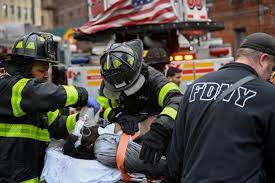Monday
Because there were nine children among the 19 people who died in yesterday’s horrific Bronx fire, Dylan Thomas’s “Refusal to Mourn the Death, by Fire, of a Child in London” came to mind. I’ve written about the poem before but I’m repurposing that post to apply to the tragedy.
The conflagration appears to have been caused by a malfunctioning space heater, and the fire is being described as one of the worst in the city’s history. Another 12 inhabitants are still in area hospitals, with 63 having been injured in all.
As Thomas intends, readers are initially horrified by the sentiment expressed in the poem’s title. The poet uses this strategy to get us to focus on the victim.
That’s because normally, when we hear of a tragedy, we fit it into a recognizable category. In doing so, we remove some of the sting, but in the process we also distance ourselves from it. While not exactly dehumanizing the victims, we check a kind of mourning box and then move on.
At the risk of appearing heartless, the poet rejects this approach. He wants us to rethink our conventional responses to how we react to “the majesty and burning of the child’s death”:
I shall not murder
The mankind of her going with a grave truth
Nor blaspheme down the stations of the breath
With any further
Elegy of innocence and youth.
Keep in mind that Thomas is referring to a tragedy that dwarfs the Bronx fire tragedy. Almost 40,000 Londoners were killed by the London Blitz during World War II, with another 50,000 seriously injured. One of these was the girl mentioned in the poem, who comes to stand in for everyone.
How does “a grave truth” murder “the mankind of her going”? Perhaps fatalistically pointing out that we will all inevitably encounter the truth of the grave diminishes the death. So does a conventional elegy, which is sure to mention her innocence and youth. As we read the poem, we find ourselves struggling to put into words what is beyond words.
The poem’s final line also resists comfortable containment as it can be read two ways. Does “After the first death, there is no other” refer to Christianity’s vision of eternal life? Christian language can be found throughout the poem, including in the “stations of the breath” (cross) that we use to articulate our grief. Or does it express atheism’s belief that when we die, we just die?
The opening stanzas don’t make it any clearer. With images of our making and our final silence, Thomas could be referring to the Book of Genesis and Revelation. But maybe not. In any event, our own momentous life cycle—momentous at least to us—is just as momentous for this girl.
Despite the title, I sense that both the child and all who died along with her are indeed mourned. I find something comforting in her being with those who have gone before, as well as with nature in its eternal cycle. The Thames may not mourn, but we do. As with other great elegies (I think especially of Shelley’s Adonais, where he mourns Keats), we watch the poet struggle with meaninglessness. As with other great elegies, this one doesn’t allow this unnamed girl to slip easily from memory once we have put in the requisite mourning.
As I say, Thomas’s poem gets me to think more fully about all those who have died in the Bronx fire.
A Refusal to Mourn the Death, by Burning, of a Child in London
By Dylan Thomas
Never until the mankind making
Bird beast and flower
Fathering and all humbling darkness
Tells with silence the last light breaking
And the still hour
Is come of the sea tumbling in harness
And I must enter again the round
Zion of the water bead
And the synagogue of the ear of corn
Shall I let pray the shadow of a sound
Or sow my salt seed
In the least valley of sackcloth to mourn
The majesty and burning of the child’s death.
I shall not murder
The mankind of her going with a grave truth
Nor blaspheme down the stations of the breath
With any further
Elegy of innocence and youth.
Deep with the first dead lies London’s daughter,
Robed in the long friends,
The grains beyond age, the dark veins of her mother,
Secret by the unmourning water
Of the riding Thames.
After the first death, there is no other.
